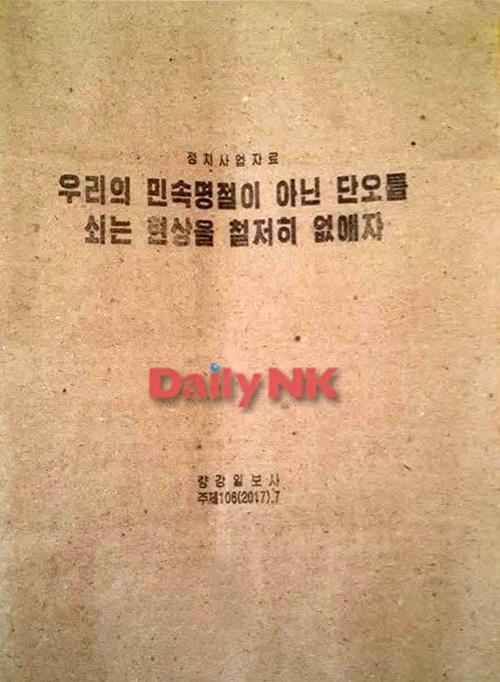
The North Korean authorities have ordered the population not to celebrate the traditional Dano holiday, which originated in China and is held on the fifth day of the fifth month of the lunar calendar. Stressing their “independence,” the regime is seeking to turn public opinion against China in retaliation for their compliance with international sanctions.
Daily NK recently received a document published by the Ryanggang Ilbo, the mouthpiece of the local Workers’ Party, entitled, “We must completely eliminate celebrations of the Dano holiday, which is not Korean!” The article was labeled as “political training material,” and describes the holiday as being “borrowed by officials of the Joseon Dynasty who wanted to legitimize their positions by following China’s holidays.”
The document quotes Kim Jong Il as saying, “If we do not protect our independence and the purity of our people, the revolution and all we have built will collapse. The people will become stupefied and our nation will fail. How can Joseon (North Korea) celebrate this holiday, whose purpose is to commemorate the drowning of a man from another country (China)?”
The holiday, known as the Duanwu Festival in China, is considered by some as an opportunity to remember the death of the poet Qu Yuan who drowned in 278 BCE.
Kim Jong Un has also been quoted as saying, “We must earnestly move forward with eliminating the Dano holiday.” The document goes on to say that “the question of continuing this holiday is not merely a practical matter, but rather, in accordance with the wishes of Kim Jong Il, the teachings of Kim Jong Un, and our ideological foundation, a question of political compatibility.” In other words, the authorities are declaring that the celebration of Dano has become a political crime.
These statements by North Korea stressing the “independence and purity of the Korean people” appear to be in response to China’s decision to enforce UN sanctions against the regime.
Another major example of this came in May this year, when the North Korean government’s news arm KCNA published an unprecedented statement admonishing China, saying, “North Korea has not crossed the red line with China, but rather China has, without hesitation, violently trampled all over it.”
Such statements can also be interpreted as attempts by the authorities to regain lost ground on the ideological front, using the negative effects of sanctions to inspire a nationalist reawakening among the people.
Daily NK spoke on condition of anonymity with one 24-year-old defector who stated, “Dano typically occurs each year during the height of mobilizations for the May ‘Rice-Planting Battle,’ so most people are extremely busy. However, some people do still celebrate the holiday by visiting their relatives’ graves or going out for a picnic. The government sees this as a loss of productivity and therefore wants to eliminate the holiday, but they are disguising it as an ideological matter.”
The statement demonstrates this point with an anecdote, stating that “a man from the Rachuk Collective Farm in Kim Hyung Jik County (Ryanggang Province) celebrated the holiday this year on May 30th, preparing lots of food and soju to bring to his father’s grave. The man and his family visited the grave and enjoyed the food and drank the soju in remembrance of his father who died last September. But the man did not go to work the next day.”
Going further, it states that “we must take a firm stand and never allow such dining with others from organizations, factories, offices, farms, or even relatives and siblings as part of this holiday. Everybody must rise up and fight to put an end to these kinds of gatherings. Dano celebrations only serve to harm our socialist system and aid our deranged enemies.”
This precise focus on the Dano holiday can thus also be seen as an example of how the Party is attempting to eliminate holidays and other resting days that it believes are cutting into its production goals.
Other language within the article suggests that the authorities hope people will turn against Dano due to certain outdated superstitions associated with the holiday.
The article recounts a story where “a worker from the O-il Collective Farm in Kamsan County believed that anointing one’s home with blood and carrying out household repairs on Dano brings good fortune,’ so he slaughtered one of his chickens, painted its blood on timber and then used it to tend to the house repairs. He was then mocked and ridiculed by his neighbors.”
But another defector interpreted the move as mere political opportunism, saying that “while the authorities have typically cracked down on old superstitions, in this case, they simply saw Dano as an opportunity to target workers and party members for more ideological training. It is just another reflection of the fact that the government has never been able to fully unite the people around their ideology.”




















